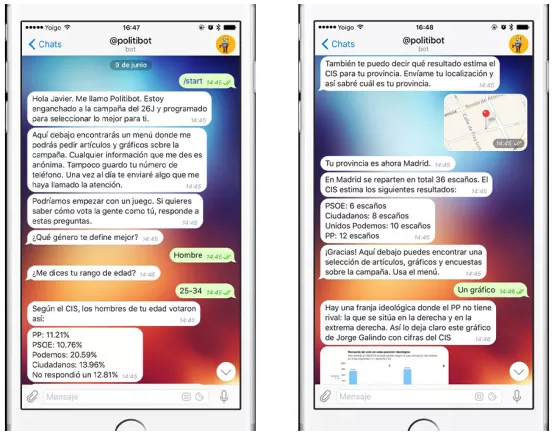
The recent bot boom among platforms and publishers can be traced back to Telegram. The encrypted, cloud-based messaging app — with Russian roots and 100 million users — may not be as well known as Facebook Messenger, but it helped jump-start the bot bonanza last June when it released its bot platform, well before other messaging apps.
The latest chatbot to come to Telegram is Spain’s Politibot, created by El Español co-founder Eduardo Suarez, to deliver news on the Spanish election. Telegram is already popular among the politically minded set in Spain: The four main political parties use it to send updates on their campaigns, and Spanish publications like El Diario and El Mundo use it to broadcast to their thousands of followers.
“We wanted to go further than what we had already seen on the platform, which was quite rudimentary,” said Suarez, who released the bot June 9. “We wanted to create this concept of having daily conversations with readers.”
Since launch, Politibot has amassed 6,000 users, one third of whom use the bot for over five minutes a day, across 30,000 sessions, in some cases matching the interaction that publishers are seeing from Facebook Messenger bots. Suarez and his team of six journalists and developers built the bot themselves in 15 days. (Other publishers, like TechCrunch and Forbes, have also launched bots on Telegram, but those have relied on the web-based tool ChatFuel to create them.)
Like other bots, Politibot offers multiple-choice options for readers to learn more about topics. But it also has some personalization capabilities, feeding readers news on how their local constituency is doing or how their demographic is likely to vote. It has some natural-language understanding too, which the team hopes to have fully in place for election night on June 26. It can understand simple commands like “hello.” If users try to insult or confuse it, the bot responds with GIFs pulled in from Giphy, giving some semblance of a human touch, according to Suarez.

About 35 percent of what Politibot sends out is original content, stories and charts created by its journalists. The rest is charts and articles that link back to the web from within the app, taken from news sources like El Diario, El Mundo and El Pais. These are chosen by the Politibot team and uploaded into the database each day.
“We’re not interested in traffic,” said Suarez. “Some is our content, and the rest we share to other news outlets; we think that has a value.” Politibot took its cue from Quartz, which also links out to other news sources.
The ability to create bots on Telegram has been around for the last year, compared to Kik or Facebook, which have been open for a couple of months. With some coding know-how, it can be quick and easy to build a bot on Telegram. “Facebook is more limited in what you can build; you have to use their tech or companies like ChatFuel,” said Daniel Price, head of social operations at Lost Boys.
“The advantage to Telegram is the privacy of data, with Facebook you’re the product,” added Price. Secure messaging apps like Signal are gaining attention too, as people get more savvy with their data, apps like Telegram will become more appealing.
Despite growing numbers, the founders aren’t rushing to monetize the platform. Nikolai and Pavel Durov, founders of VK, Russia’s equivalent to Facebook, have made a tidy sum from selling VK, and their stance on advertising is clear: “Telegram is free forever. No ads. No subscriptions fees.” That said, there are still ways for publishers on the app to make money through commerce, referral links or third-party companies like Outbrain.
Telegram still has its drawbacks, the most notable being that it appears to be the preferred messaging app for jihadists. And as with other messaging apps, data is limited, and the discoverability is poor. There is no official bot store, so users have to search Telegram for them. Currently Suarez has to get the word out by tweeting from the Politibot account (which has 2,500 followers) and encourage people with Telegram to tell their friends.
More important, Telegram’s API only allows 30 messages to be sent per bot, across all its users, per second. Come election night, Suarez is expecting many messages from readers. If the bot can only send out 30 messages to users each second, people will be left waiting for a reply, resulting in a sub-par experience. Suarez is talking to Telegram about how to make this smoother.
After Spain’s election, Politibot will likely cover other big elections. “This is one of the most innovative areas in journalism,” said Suarez. “I want to see the value in getting in front of those people who are increasingly using messaging apps.”
More in Media

In Graphic Detail: The scale of the challenge facing publishers, politicians eager to damage Google’s adland dominance
Last year was a blowout ad revenue year for Google, despite challenges from several quarters.

Why Walmart is basically a tech company now
The retail giant joined the Nasdaq exchange, also home to technology companies like Amazon, in December.

The Athletic invests in live blogs, video to insulate sports coverage from AI scraping
As the Super Bowl and Winter Olympics collide, The Athletic is leaning into live blogs and video to keeps fans locked in, and AI bots at bay.





